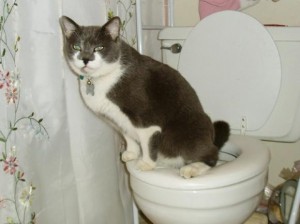The Consequences of Flushing Cat Poop Down Your Toilet - Safeguard Your Pipes
The Consequences of Flushing Cat Poop Down Your Toilet - Safeguard Your Pipes
Blog Article
Each person will have their own individual assumption with regards to How to Dispose of Cat Poop and Litter Without Plastic Bags.

Introduction
As cat proprietors, it's necessary to be mindful of just how we deal with our feline close friends' waste. While it might seem hassle-free to flush cat poop down the toilet, this method can have damaging effects for both the setting and human health.
Environmental Impact
Flushing cat poop introduces hazardous microorganisms and parasites into the water system, posturing a substantial threat to water communities. These pollutants can negatively impact aquatic life and concession water high quality.
Health Risks
Along with environmental concerns, purging cat waste can additionally position health risks to humans. Feline feces might have Toxoplasma gondii, a parasite that can create toxoplasmosis-- a possibly serious ailment, specifically for pregnant ladies and individuals with weakened body immune systems.
Alternatives to Flushing
Fortunately, there are safer and extra liable methods to take care of pet cat poop. Consider the following alternatives:
1. Scoop and Dispose in Trash
The most common method of getting rid of cat poop is to scoop it right into an eco-friendly bag and toss it in the trash. Be sure to make use of a specialized trash scoop and get rid of the waste promptly.
2. Usage Biodegradable Litter
Go with biodegradable pet cat trash made from products such as corn or wheat. These clutters are environmentally friendly and can be securely thrown away in the trash.
3. Hide in the Yard
If you have a yard, think about hiding cat waste in a marked area away from veggie yards and water sources. Make sure to dig deep adequate to prevent contamination of groundwater.
4. Install a Pet Waste Disposal System
Purchase a pet dog garbage disposal system specifically designed for feline waste. These systems make use of enzymes to break down the waste, reducing smell and ecological effect.
Conclusion
Accountable family pet possession expands beyond supplying food and shelter-- it also involves appropriate waste administration. By refraining from purging cat poop down the commode and selecting alternative disposal techniques, we can reduce our environmental footprint and safeguard human health and wellness.
Why You Should Never Flush Cat Poop Down the Toilet
A rose by any other name might smell as sweet, but not all poop is created equal. Toilets, and our sewage systems, are designed for human excrement, not animal waste. It might seem like it couldn’t hurt to toss cat feces into the loo, but it’s not a good idea to flush cat poop in the toilet.
First and foremost, assuming your cat uses a litter box, any waste is going to have litter on it. And even the smallest amount of litter can wreak havoc on plumbing.
Over time, small amounts build up, filling up your septic system. Most litter sold today is clumping; it is made from a type of clay that hardens when it gets wet. Ever tried to scrape old clumps from the bottom of a litter box? You know just how cement-hard it can get!
Now imagine just a small clump of that stuck in your pipes. A simple de-clogger like Drano isn’t going to cut it. And that means it’s going to cost you big time to fix it.
Parasitic Contamination
Believe it or not, your healthy kitty may be harboring a nasty parasite. Only cats excrete Toxoplasma in their feces. Yet it rarely causes serious health issues in the cats that are infected. Most people will be fine too if infected. Only pregnant women and people with compromised immune systems are at risk. (If you’ve ever heard how women who are expecting are excused from litter cleaning duty, Toxoplasma is why.)
But other animals may have a problem if infected with the parasite. And human water treatment systems aren’t designed to handle it. As a result, the systems don’t remove the parasite before discharging wastewater into local waterways. Fish, shellfish, and other marine life — otters in particular — are susceptible to toxoplasma. If exposed, most will end up with brain damage and many will die.
Depending on the species of fish, they may end up on someone’s fish hook and, ultimately on someone’s dinner plate. If that someone has a chronic illness, they’re at risk.
Skip the Toilet Training
We know there are folks out there who like to toilet train their cats. And we give them props, it takes a lot of work. But thanks to the toxoplasma, it’s not a good idea.

Hopefully you liked our post on How to Dispose of Cat Poop and Litter Without Plastic Bags. Thanks a ton for finding the time to read our article post. If you enjoyed our blog entry please be sure to pass it around. Many thanks for your time. Please come by our blog back soon.
Here Report this page